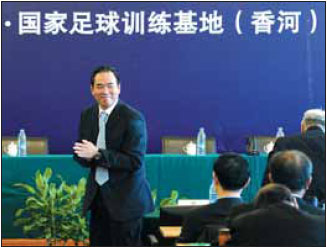Youth key to kickstarting Chinese soccer
|
Cai Zhenhua is elected president of the Chinese Football Association at the association's 10th national congress in Xianghe, Hebei province, on Tuesday. Provided to China Daily |
Nation aims to boost world ranking, narrow gap with Asian neighbors
China's newly elected soccer governing body is making the development of young talent its priority for the next decade.
While China's neighbors Japan and South Korea are envisioning great results at the 2014 Brazil World Cup, the Chinese national team is still struggling to make the final stage of the 2015 Asian Cup.
Soccer officials and representatives agreed that poor youth development has made the difference.
"Only by further promoting the game among teenagers can Chinese soccer have a decent future. And how to solidify the youth foundation will be the pivot of our work in the future," Cai Zhenhua, the newly elected president of the Chinese Football Association, said during the association's 10th national congress on Tuesday.
In the first reshuffle of the CFA executive board in a decade, Cai was elected by a unanimous vote to replace 75-year-old Yuan Weimin, who had held the position of CFA president since 1992.
Cai, 53, will be faced with the daunting task of revitalizing the sport in China.
According to the draft plan for the long-term development of Chinese soccer unveiled at the congress, the number of teenager soccer players should surpass 500,000 by 2017 and reach 1 million by 2022. All levels of national teams should improve their world rankings significantly and narrow the gap with Asian powers like Japan and South Korea in 10 years.
"Sports' governing bodies should join hands with education authorities to urge more students to step on the soccer pitch and to convince parents that playing the game will benefit their children," Cai said.
Cai's sentiment was echoed by the CFA's new eight-member executive committee, which was elected at the congress and for the first time includes a representative from the Ministry of Education.
Wang Dengfeng, director of the Physical Education, Health and Art Department at the Ministry of Education, was elected vice-president of the CFA. Insiders said his involvement could break barriers between the country's professional sports and school systems.
"It's good news to see the involvement of the education ministry," Chi Shangbin, former national team captain and assistant coach, told China Daily. "The education department could help the youth soccer program reach more schools at the grassroots level through its administrative power."
The population of student players has shrunk significantly due to the tarnishing of the game's reputation by match-fixing and bribery scandals, which has also resulted in shutdowns of soccer academies despite Guangzhou Evergrande's inspirational victory at the AFC Champions League.
According to Zhang Jian, secretary-general of CFA, there are 190,000 student players registered at local sports authorities, less than one-third of the amount in 1995. The number of soccer schools in operation has dropped from 1,000 in the 1990s to the current 20.
Japan set a great model for its Asian counterparts by building a pyramid system, channeling primary school leagues to university leagues, and then into professional divisions.
After using the system for years, the Japanese women's national team went on to win the 2011 World Cup, and its men's and youth teams are also competitive forces at the international level.
By comparison, China's youth training structure relies heavily on the reserve training systems of 16 top-league professional clubs and rarely drafts talent from campuses.
The education authority expects to make a difference by introducing soccer as mandatory physical education at more than 5,000 primary and secondary schools.
"We hope to develop students' interests in the game from an early age. Soccer's educational impact on helping children to grow physically and mentally should be further stressed," Wang said.
Youth training initiatives launched by entrepreneurs such as the Evergrande Football School have given an example of a combination of pro-soccer training and academic study.
The Evergrande school, a cooperative project between real estate company Evergrande and La Liga giant Real Madrid that started operation in 2012, boasts an experienced youth training crew from the Spanish club and academic education provided by South China Normal University.
More than 2,300 students have registered at the school, where they practice and study full time.
sunxiaochen@chinadaily.com.cn

























